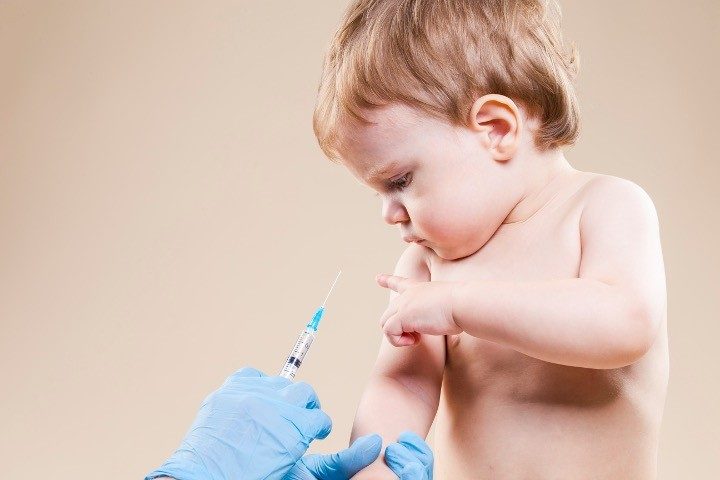
The pharmaceutical company Moderna announced it is set to request an emergency use authorization (EUA) from the Food and Drug Administration (FDA) for its Covid shot for children ages six months to six years old. The vaccine’s efficacy is estimated to be less than 44 percent for infants, and less than 38 percent for children aged two to six.
According to the announcement posted on Moderna’s website, Phase 2/3 of the so-called KidCOVE study showed “a robust neutralizing antibody response” and “a favorable safety profile” of the two-shot dose that contained a quarter, or 25 μg, of the adult mRNA dose.
KidCOVE tested Moderna’s shot on children in two age groups: from six months to under two years, and from two years to under six years of age.
The U.S. federal government took part in the trials. Per Moderna, the trials on children are being conducted in collaboration with the National Institute of Allergy and Infectious Diseases (NIAID), part of the National Institutes of Health (NIH), and the Biomedical Advanced Research and Development Authority (BARDA), part of the Office of the Assistant Secretary for Preparedness and Response at the U.S. Department of Health and Human Services (HHS).
The company will be sending the documents to the FDA, the European Medicines Agency (EMA), and “other global regulators” in the coming weeks, per the announcement.
Stéphane Bancel, chief executive officer of Moderna, noted that there is “the need for a vaccine against COVID-19 in infants and young children,” and that his company will be submitting the data “as soon as possible.” The top pharma executive added that he believes the vaccine for infants and young children “will help end this pandemic.”
Despite the fanfare, the announcement provides that Moderna’s shot efficacy in children six months to two years old was just 43.7 percent. It was even lower in the older age group, with a 37.5-percent efficacy rate in children two to under six years old.
Moderna does not see it as a problem, and says that the “majority” of Covid cases in participants “were mild, and no severe COVID-19 disease was observed in either age group.”
“The absence of any severe disease, hospitalization, or death in the study precludes the assessment of vaccine efficacy against these endpoints,” concludes the biotech giant.
In an interview with The New York Times, Dr. Jacqueline Miller, Moderna’s senior vice president for infectious diseases, said, “What we have seen is a successful trial.”
“What I will say is 37.5 percent and 43.7 percent are higher than zero,” she added. “If I were the parent of a young child, I would want there to be some protection on board, especially if we see another wave of infections.”
Some biotech experts, such as French-American consultant Marc Girardot, argue that the immune protection against coronaviruses in humans is never “zero,” since people have always been surrounded by them and have developed a certain level of immunity.
For Moderna, it is obviously not the case.
As do their colleagues at Pfizer, Moderna believes that to generate a higher immune response in children, they would need to take three instead of two doses.
“Similar to adults, Moderna is preparing to evaluate the potential of a booster dose for all pediatric populations, including those aged 6 months to under 6 years, 6 to under 12 years, and adolescents,” the company says, adding that one of the booster candidates would include the omicron variant booster.
According to a study published by the New York State Department of Health in late February, Pfizer-BioNTech’s two-dose Covid shot, which, like Moderna’s, uses mRNA technology, provided abysmal protection for children aged five to eleven during the wave of omicron infection in New York. As reported by The New American on the matter,
During the Omicron surge from December 13, 2021 through January 30, 2022, the effectiveness against infection plunged from 68 to just 12 percent for children in that age group. Protection against hospitalization dropped from 100 to 48 percent during the same period.
Moderna also indicated that it has initiated the submission of the document needed for the FDA to authorize its 50-μg, two-dose shot for children aged six to under 12 years.
Finally, the company is updating its request to authorize its shot for those aged 12 to 17. That request, which was filed last summer, was put on hold in October 2021 because the FDA asked the company to provide more data on such side effects associated with the shot as myocarditis, or inflammation of the heart.
As reported by The New American at that time, the Nordic countries have suspended administering Moderna’s Covid “Spikevax” vaccine over an increased risk of side effects such as inflammation of the heart muscle in younger recipients, and have recommended that men under the age of 30 not take it.
On January 31, 2022, the FDA granted full approval for Moderna’s shot, marketed as “Spikevax,” to be used on people aged 18 and older. The agency also shortened the recommended interval between the initial inoculation and booster shot from six to five months.
Moderna and the NIH share ownership of the shot’s patent.





